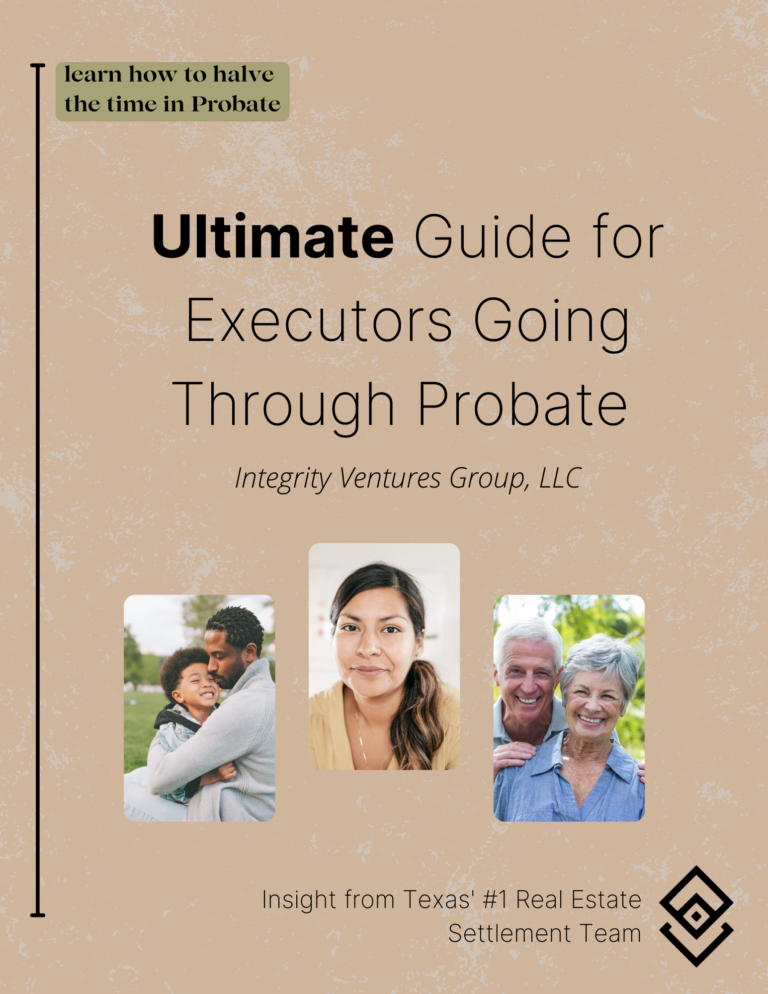do you want to cut your probate Process time in half?
Avoiding Probate in Texas: Exploring Alternative Estate Planning Options
disclaimer
Integrity Ventures Group asserts that it is not a licensed lawyer, and this article is intended solely for providing general guidance and information, and should not be considered as legal advice or a substitute for consulting with a qualified attorney. For any specific legal grievances related to personal probate cases, we strongly advise individuals to seek professional legal counsel and engage the services of a licensed attorney.
At Integrity Ventures Group, we pride ourselves on being the premier estate settlement firm in Texas. Our expertise lies in assisting families daily, helping them unravel the complexities of their probate proceedings alongside their attorneys. We would be honored to extend our knowledge to help guide you through your unique journey as well. Let’s Dive into: avoiding probate in Texas.
Introduction
Navigating the probate process in Texas can be time-consuming, costly, and emotionally draining. While probate serves as a legal framework to settle estates, many Texans seek alternative estate planning options to bypass this cumbersome system. If you’re wondering how to avoid probate in Texas, this comprehensive guide explores various alternatives that can simplify estate management and asset distribution.
Why Avoid Probate?
Before delving into alternatives, it’s essential to understand why avoiding probate might be a desirable goal:
- Time Efficiency: Probate can take months or even years to conclude, delaying asset distribution to beneficiaries.
- Costs: Between court fees, attorney costs, and executor fees, probate can be expensive.
- Privacy: Probate records are public, meaning the details of an estate, including its value and who the beneficiaries are, become publicly accessible.
- Creditor Claims: Probate assets are subject to creditor claims, potentially diminishing the estate’s value.

Alternative Estate Planning Options to Avoid Probate in Texas
Revocable Living Trusts
Creating a revocable living trust allows you to transfer your assets into a trust during your lifetime. You can be the trustee and beneficiary, maintaining control over your assets. Upon your death, the successor trustee distributes assets directly to the trust’s beneficiaries, bypassing probate.
Joint Ownership
Assets owned jointly with rights of survivorship automatically pass to the surviving owner, avoiding the probate system altogether. Types of joint ownership include:
- Joint Tenancy: Equal ownership between two or more individuals.
- Community Property: A form of joint ownership between married couples in Texas.
Payable-on-Death (POD) and Transfer-on-Death (TOD) Designations
Financial accounts like bank accounts, CDs, and retirement accounts often allow you to name a POD or TOD beneficiary. Upon your death, the assets in these accounts pass directly to the named beneficiaries without going through probate.
Life Insurance Policies
A life insurance policy with a named beneficiary can pass outside of probate. The funds go directly to the beneficiary, offering immediate financial support without the need for court approval.
Gifting Assets
Transferring assets as gifts while you’re alive removes them from your estate, reducing the amount that would go through probate. However, this strategy must be approached carefully due to potential tax implications.
Lady Bird Deeds
Specific to some states, including Texas, a Lady Bird deed allows you to transfer property to beneficiaries while retaining control over it during your lifetime. This specialized deed becomes effective upon your death, transferring the property directly to the beneficiaries.
Potential Pitfalls and How to Avoid Them
While avoiding probate sounds appealing, it’s essential to be cautious:
- Improper Setup: Trusts or joint ownership arrangements need to be set up correctly to be effective.
- Tax Implications: Gifts and certain asset transfers may have tax consequences.
- Conflicts: Different beneficiary designations in multiple documents can lead to disputes among heirs.
To sidestep these pitfalls, consult with an experienced estate planning attorney who specializes in Texas laws. They can guide you in setting up valid and effective arrangements tailored to your unique circumstances.
Essential Tips for Effective Estate Planning in Texas
- Consult Professionals: Utilize the expertise of estate planning attorneys, financial advisors, and tax experts.
- Regular Updates: Keep your estate plan updated, particularly after major life events like marriage, divorce, or the birth of a child.
- Clear Communication: Discuss your estate planning measures with family members to minimize disputes or confusion later on.
Final Thoughts: Avoiding Probate in Texas
The goal to avoid probate in Texas is not just about evading a legal process; it’s about ensuring a smooth transition of assets to your loved ones with minimal delays, costs, and stress. By taking the time to explore these alternative estate planning options, you can offer your family the gift of financial and emotional peace during an otherwise challenging time.
FIND MORE HELPFUL ARTICLES LIKE THIS ONE
DOWNLOAD YOUR PROBATE CHECKLIST TODAY.
Become a part of the numerous executors who have already benefited from our free guide. Elevate your probate process with our complimentary probate checklist, designed to guide you step by step through the process of selling your real estate property today. Download it now and streamline your journey through probate.






